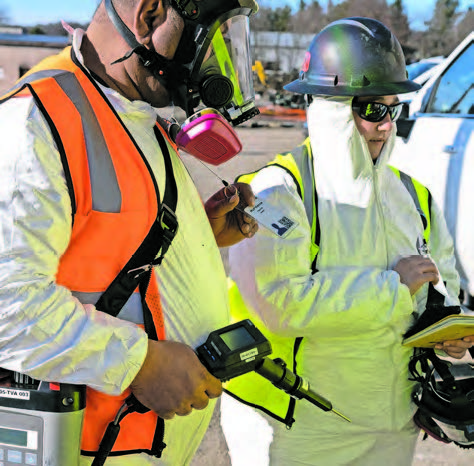
PROSPECT HEIGHTS — Katie Baxter remembers when, back in 2014, the water source in Flint, Michigan, was switched from Lake Huron to the Flint River and how, over time, residents began seeing discoloration in the water, feeling itching in their hair, and breaking out in rashes.
What became the Flint water crisis garnered international headlines, with residents falling ill, lead being found in the water supply — and a failed government response. Nine years later, Baxter sees parallels in the response to the woes in Flint and those developing in the aftermath of the recent toxic train derailment in East Palestine, Ohio.
Baxter, CEO of Catholic Charities of Shiawassee and Genesee Counties in Michigan, said it’s crucial for the Catholic Charities organization around East Palestine — Catholic Charities Youngstown — to be the trusted resource for people in the community.
“I think it’s important for the Catholic Charities organization in that area to remember that we’re the trusted organizations that people will go to in their time of need because they know the intention of these organizations is to help people. It’s God’s work,” Baxter said. “They’re in a good place to share messages, accurate information about where and how to get help, to be at the table, know what resources are available, and to open their doors.”
That’s what Baxter said Catholic Charities of Shiawassee and Genesee Counties did throughout the Flint water crisis. She said the organization led efforts to bring in and distribute clean water. But equally as important, it became a trusted source in the community.
“We knew it was going to be a long-term issue, and Catholic Charities was a recognized and trusted organization to help because when this happened, the community did not trust the government, and even a lot of nongovernment organizations that people viewed as some kind of government entity,” Baxter said.
“So Catholic Charities had been and continues to be a trusted source, so people came to Catholic Charities for all kinds of support and resources.”
Catholic Charities Youngstown did not respond to a request for comment on how it was helping the residents of East Palestine.
Father David Misbrener, pastor of Our Lady of Lourdes in East Palestine, told The Tablet that his parishioners are doing well, “but it remains to be seen if some will move away or put their homes up for sale.”
Mistrust in government has been at the heart of the problem in East Palestine. Ever since the train carrying toxic chemicals, operated by the Norfolk Southern Corporation, derailed in early February, residents and town officials have been critical of what’s been considered a slow and poor response to the incident by government agencies.
The derailment displaced residents, ignited a fire, and sent poisonous toxins into the air, leading residents to fear just how contaminated the air, water, and soil in the area had become.
A Biden administration official didn’t visit the town until two weeks after the derailment. The Ohio Environmental Protection Agency cleared residents to drink village water on Feb. 15, but the death of thousands of fish kept residents doubtful.
Cleanup of the site will likely take about three months, Environmental Protection Agency Administrator Michael Regan announced Friday, March 17.
Michael Barasch, managing partner at Barasch and McGarry, who has long advocated for those harmed by toxins in the air after 9/11, recently told Currents News that he “got shivers down his spine” when he heard that the EPA told residents of East Palestine the water was safe to drink.
He encouraged them to remain wary of what the EPA says.
“That’s exactly what [former New Jersey governor] Christine Todd Whitman said five days after 9/11 to assure the residents of Lower Manhattan, the people on Wall Street, the downtown students, that it was safe to return to school, to offices, to their work,” Barasch said. “It wasn’t safe. We now know that 69 cancers have been linked to the World Trade Center toxins.”
Norfolk Southern has also drawn the ire of residents after it was a no-show at a Feb. 16 town hall. It last said on March 14 that its cleanup efforts are ongoing and that it is prepared to work with stakeholders to continue to make sure residents have clean drinking water.
The rail company was sued by the state of Ohio over the incident last week.
From her experience in Flint, Baxter said it’s important for the government and organizations responsible “to be as transparent as possible and to allow ample opportunity for the community to have their voices heard.
“The trust factor cannot be emphasized enough. Transparency, and commitment to do what is right, even though sometimes doing what’s right is expensive,” Baxter said. “When there’s been any kind of environmental impact on people, people need a chance to share their voices.”
“I would encourage [residents] to share their voice and be active in any opportunities to share their concerns and accurate information about what they are going through,” Baxter added. “And be a part of the solution to demand that the entities that are working on cleanup and are actually listening and have their input in mind when decisions are being made.”
